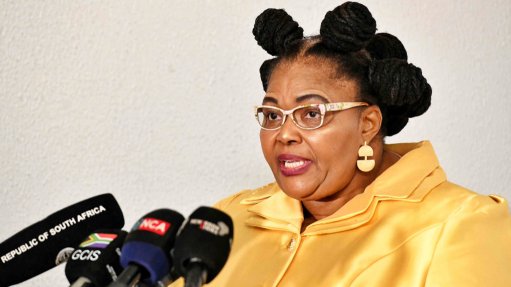Sustainable strategies for digitalisation needed, from raw materials to waste management
The nature and scale of the digital sector’s environmental footprint remains largely unassessed, and there is an urgent need for sustainable strategies throughout the life cycle of digitalisation, from raw material extraction and use of digital technologies to waste generation.
This is according to the United Nations Trade and Development's (Unctad's) 'Digital Economy Report 2024: Shaping an Environmentally Sustainable and Inclusive Digital Future'.
Developing countries, often rich in the resources needed for digital technologies, bear a disproportionate burden of its costs while reaping limited benefits. For example, discarded smartphones, laptops, screens and other electronic devices grew by 30% between 2010 and 2022, reaching 10.5-million tons globally.
Developed countries generated an average of 3.25 kg of e-waste per person, compared to less than 1 kg in developing countries and 0.21 kg in least-developed countries.
Only 24% of this waste was formally collected globally in 2022, with a mere 7.5% collected in developing countries.
There is a pressing need to address the environmental costs of rapid digital transformation. Key concerns include the depletion of finite raw materials for digital and low-carbon technologies, escalating water and energy consumption and the growing issue of digitalisation-related waste.
As digitalisation progresses at an unprecedented rate, understanding its link to environmental sustainability becomes increasingly critical.
Unctad calls for global policies involving all stakeholders to enable a more circular digital economy and reduced environmental footprints from digitalisation, while ensuring inclusive development outcomes.
“The Digital Economy Report 2024 underscores the urgent need for action at all levels, from governments and businesses to international organisations and civil society. We must embrace a new mindset that considers sustainability at every stage of the digital life cycle,” says Unctad secretary-general Rebeca Grynspan.
“As we navigate this complex landscape, international cooperation is paramount. We must strive for equitable distribution of the benefits and costs of digitalisation, ensuring that no one is left behind in the digital age.
“We must work together to establish comprehensive global governance frameworks that promote sustainable digital practices and empower developing countries to participate fully in the digital economy.”
Digitalisation drives global economic growth and offers unique opportunities for developing countries, but its environmental repercussions are becoming increasingly severe, the report adds.
“We must harness the power of digitalisation to advance inclusive and sustainable development, while mitigating its negative environmental impacts. This requires a shift towards a circular digital economy, characterised by responsible consumption and production, renewable energy use and comprehensive e-waste management.
“The digital economy’s growing environmental impact can be reversed,” Grynspan says.
Further, developing countries remain unevenly affected both economically and ecologically owing to existing digital and development divides, but they have the potential to leverage this digital shift to foster development.
Developing countries are pivotal in the global supply chain for transition minerals and metals, which are highly concentrated in a few regions.
Africa’s vast mineral deposits, essential for the global shift to low-carbon and digital technologies, include cobalt, copper, and lithium, crucial for a sustainable energy future. The continent holds significant reserves: 55% of the world's cobalt, 47.65% of manganese, 21.6% of natural graphite, 5.9% of copper, 5.6% of nickel and 1% of lithium.
According to the World Bank, demand for minerals required for digitalisation like graphite, lithium and cobalt could surge by 500% by 2050.
The increased demand presents a development opportunity for resource-rich developing countries, if they can add value to extracted minerals, use proceeds effectively and diversify within the value chain and other sectors, the report highlights.
“Developing countries should maximise this opportunity by domestic processing and manufacturing. This would help them secure a larger share of the global digital economy, generate governments revenues, finance development, overcome commodity dependence, create jobs and raise living standards.”
The report underlines the need to integrate digital and environmental policies and calls for urgent and bold action to ensure an equitable and environmentally responsible digital economy.
This approach aims to allow countries to benefit from the opportunities the digital economy presents while safeguarding the interests and well-being of current and future generations, Unctad says.
Article Enquiry
Email Article
Save Article
Feedback
To advertise email advertising@creamermedia.co.za or click here
Press Office
Announcements
What's On
Subscribe to improve your user experience...
Option 1 (equivalent of R125 a month):
Receive a weekly copy of Creamer Media's Engineering News & Mining Weekly magazine
(print copy for those in South Africa and e-magazine for those outside of South Africa)
Receive daily email newsletters
Access to full search results
Access archive of magazine back copies
Access to Projects in Progress
Access to ONE Research Report of your choice in PDF format
Option 2 (equivalent of R375 a month):
All benefits from Option 1
PLUS
Access to Creamer Media's Research Channel Africa for ALL Research Reports, in PDF format, on various industrial and mining sectors
including Electricity; Water; Energy Transition; Hydrogen; Roads, Rail and Ports; Coal; Gold; Platinum; Battery Metals; etc.
Already a subscriber?
Forgotten your password?
Receive weekly copy of Creamer Media's Engineering News & Mining Weekly magazine (print copy for those in South Africa and e-magazine for those outside of South Africa)
➕
Recieve daily email newsletters
➕
Access to full search results
➕
Access archive of magazine back copies
➕
Access to Projects in Progress
➕
Access to ONE Research Report of your choice in PDF format
RESEARCH CHANNEL AFRICA
R4500 (equivalent of R375 a month)
SUBSCRIBEAll benefits from Option 1
➕
Access to Creamer Media's Research Channel Africa for ALL Research Reports on various industrial and mining sectors, in PDF format, including on:
Electricity
➕
Water
➕
Energy Transition
➕
Hydrogen
➕
Roads, Rail and Ports
➕
Coal
➕
Gold
➕
Platinum
➕
Battery Metals
➕
etc.
Receive all benefits from Option 1 or Option 2 delivered to numerous people at your company
➕
Multiple User names and Passwords for simultaneous log-ins
➕
Intranet integration access to all in your organisation


















